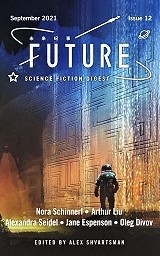 Future Science Fiction Digest #12, September 2021
Future Science Fiction Digest #12, September 2021
“Old People’s Folly” by Nora Schinnerl
“The Life Cycle of a Cyber-Bar” by Arthur Liu
“When a Sleeping Seed Blooms” by Alexandra Seidel
“Nobel Prize Speech Draft of Paul Winterhoeven, with Personal Notes” by Jane Espenson
“When the Mujna Begins” by Oleg Divov
Reviewed by Victoria Silverwolf
Authors based in Europe, Asia, and America offer a wide variety of imaginative tales in the latest issue of this magazine of international fiction.
“Old People’s Folly” by Austrian writer Nora Schinnerl takes place a few centuries in the future, long after a massive flood reduced civilization to a pre-industrial level. The main character, an elderly recluse, finds an old disc that contains the recorded consciousness of an imprisoned political activist from the time before the disaster. Their conversations, often acrimonious, lead the recluse to rescue a young man from his abusive family.
Because the activist was jailed for an act of arson that accidentally killed two people, the story raises the issue as to whether political violence can ever be justified. Although she was fighting an oppressive regime, the fact that she encourages the older woman to better the society in which she lives in a less destructive way suggests that she regrets her actions. The author manages to take a plot that could have easily become overly sentimental and make it a powerful one by creating complex, fully developed characters with ambiguous feelings.
“The Life Cycle of a Cyber-Bar” by Arthur Liu, translated from Chinese by Nathan Faries, is a madcap tale about an organism that takes the form of a tavern. As part of its existence, it induces violent barfights in its patrons, leading to an apocalyptic conclusion.
The story is narrated in multiple sections told from different points of view, adding to a feeling of chaos. Readers who are willing to go along with the premise, which becomes wilder and wilder as the plot goes on, may enjoy the darkly comic mood and unfettered imagination of this extended joke.
In “When a Sleeping Seed Blooms” by German writer Alexandra Seidel, an archaeologist works to restore an ancient mural on a distant planet. The work depicts a half-legendary ruler of an interstellar empire of long ago. An encounter with a mysterious man leads to an unexpected discovery, and the archaeologist meets an extraordinary fate.
Despite the science fiction content, this story has the feeling of fantasy. More than one dream sequence, as well as quotations from imaginary poems, add to the mythic mood. Readers are likely to figure out the identity of the man before the protagonist does, and the plot’s conclusion is unsurprising.
“Nobel Prize Speech Draft of Paul Winterhoeven, with Personal Notes” by Jane Espenson, best known for her work on fantasy and science fiction television, deals with an invention that allows one person to experience the physical and emotional suffering of another. The device is of great benefit to humanity, as it leads to a more caring, empathetic world. Ironically, the acclaimed creator of the technology is a greatly embittered man, whose true intent was to prove that his pain is more profound than that of anyone else.
The author effectively paints a vivid portrait of a very unpleasant character. Whether this makes for an enjoyable reading experience may depend on one’s ability to tolerate such a person in fiction.
In “When the Mujna Begins” by Oleg Divov, translated from Russian by Alex Shvartsman, the magazine’s editor, the Russian government issues voting devices to the nation’s citizens, so they can decide whether or not to allow an unexplained event to occur. (It should be noted here that the Russian word mujna, the translator explains, cannot be easily rendered in English. It seems to refer to something chaotic and unknowable.) Various characters discuss if they should accept the devices, whether they should vote at all, and so forth.
The author offers a satirical view of Russian politics, with critical descriptions of leaders from Stalin to Yeltsin. (The American reader might wonder why the current President is not included in this list.) The story provides an intriguing, if cynical, look at the politics of one of the world’s great nations, but many will be frustrated by the fact that it ends before the mujna occurs. Although the ineffable nature of the event appears to be the point of this mordant political fable, the sense of incompleteness remains.
Victoria Silverwolf has two new cats at home.